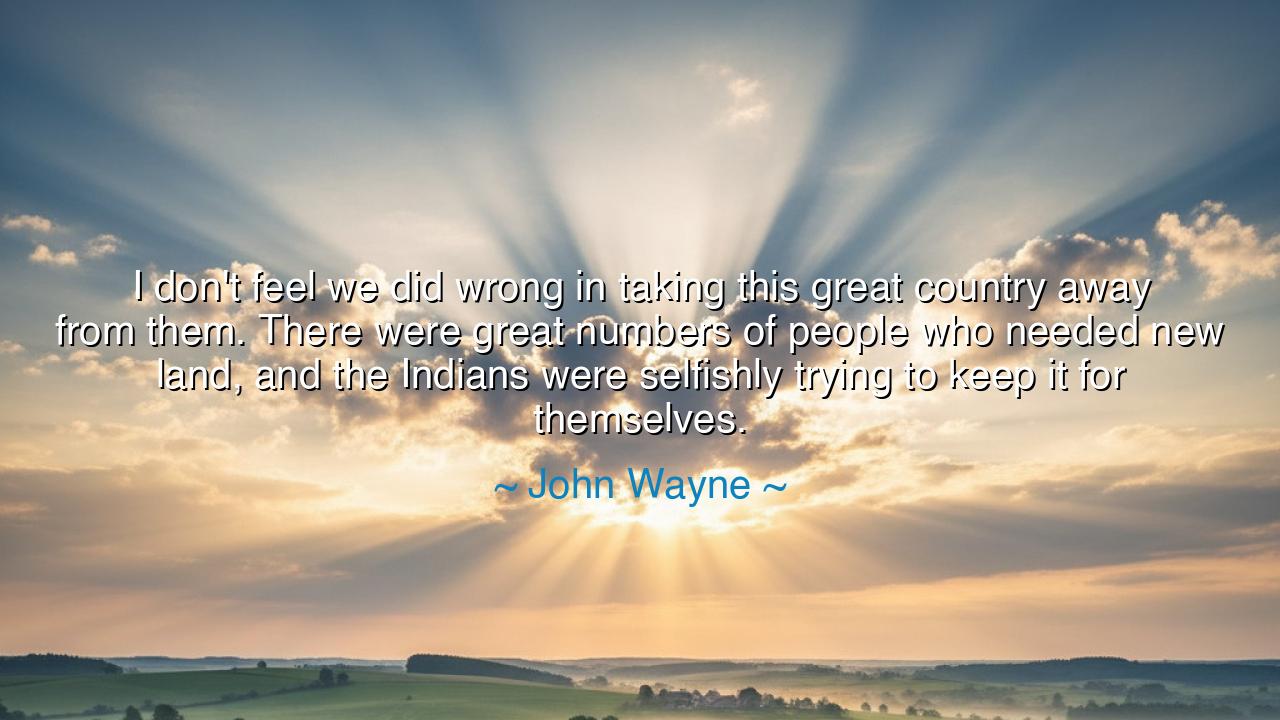
I don't feel we did wrong in taking this great country away from
I don't feel we did wrong in taking this great country away from them. There were great numbers of people who needed new land, and the Indians were selfishly trying to keep it for themselves.






In the depths of history’s shadow, John Wayne once uttered the words: “I don’t feel we did wrong in taking this great country away from them. There were great numbers of people who needed new land, and the Indians were selfishly trying to keep it for themselves.” To many, these words strike like a thunderclap — raw, unsettling, and revealing. For within them lies the echo of an age when conquest was mistaken for destiny, and possession was cloaked in the language of righteousness. This quote is not merely a statement by a man; it is the voice of an era — the voice of empire, of expansion, of humanity’s oldest temptation: to justify power as virtue.
In these words, one hears the ancient struggle between entitlement and empathy, between those who claim the earth and those who belong to it. John Wayne, a symbol of the American frontier spirit, spoke from within a culture that glorified conquest, that saw in westward expansion not the taking of land but the fulfillment of providence. His sentiment reflects what many once believed — that the advance of one people required the displacement of another, that progress demanded the silence of those who stood in its path. But history, in its long memory, teaches us that greatness built upon the suffering of others bears a cost that endures for centuries.
To the ancients, such reasoning would have been recognized as the peril of hubris — that fatal arrogance that blinds nations as surely as it blinds kings. The Greeks told of Agamemnon, who led his people to war for glory, believing the gods favored his cause, only to bring ruin upon his house. So too does this quote remind us that the hunger for expansion, untempered by justice, becomes not triumph but tragedy. When the conqueror declares the conquered “selfish,” it is not truth he speaks, but the justification of greed. For who, in their right, defends their home and is called selfish for it?
Let us look to a moment in history that reveals this pattern — the Trail of Tears, when the Cherokee, Creek, Choctaw, Chickasaw, and Seminole peoples were forced from their ancestral lands in the 1830s. Thousands perished in the march, their cries swallowed by the wilderness they had once called sacred. To those who ordered their removal, it was policy; to those who endured it, it was apocalypse. The conquerors believed they were advancing civilization — yet in truth, they were dismantling it. And in every stone of the nation they built upon that suffering, there remains an echo of those footsteps, a haunting reminder that no nation grows truly great by forgetting compassion.
The deeper meaning of Wayne’s words, when examined through time, becomes a mirror. It reflects the human tendency to justify domination, to cloak violence in reason, to call theft necessity and resistance arrogance. Yet, the wiser heart sees through such illusions. The earth belongs not to the strong or the many, but to those who walk upon it in reverence. Great numbers of people do not sanctify injustice, nor does need erase right. The ancients believed that the land itself is sacred — a living inheritance, not a commodity. To take it without honor is to offend not only those displaced, but the gods of the earth themselves.
From this understanding, a great lesson arises: true greatness is not measured by conquest but by conscience. Nations rise and fall not by their armies or wealth, but by the justice of their hearts. To those who would lead or inherit this world, remember — possession without empathy turns to poison. The wise ruler, the noble spirit, seeks not to take but to understand, not to dominate but to dwell in harmony. The strong must protect, not plunder; the many must lift the few, not cast them aside.
So, let this be the teaching drawn from such a troubling truth: question the righteousness of power, especially when it speaks sweetly of necessity. Listen for the voices beneath history’s noise — the ones silenced, the ones forgotten, for they often carry the greater wisdom. The ancients would tell us that every empire must one day face its own reflection. If it has built its greatness on the grief of others, it will crumble from within. But if it turns, if it seeks repentance, if it learns humility, it may yet find redemption.
Thus, the words of John Wayne, though born of a bygone worldview, remain valuable — not as a creed to follow, but as a warning to remember. Let us not repeat the blindness of those who mistake power for right, or call the defense of home selfishness. Let every generation learn to see with clearer eyes — that the measure of a people is not in what they take, but in what they honor. And if we can learn this, if we can walk the earth not as conquerors but as caretakers, then perhaps the story of humanity will, at last, begin to heal.






AAdministratorAdministrator
Welcome, honored guests. Please leave a comment, we will respond soon